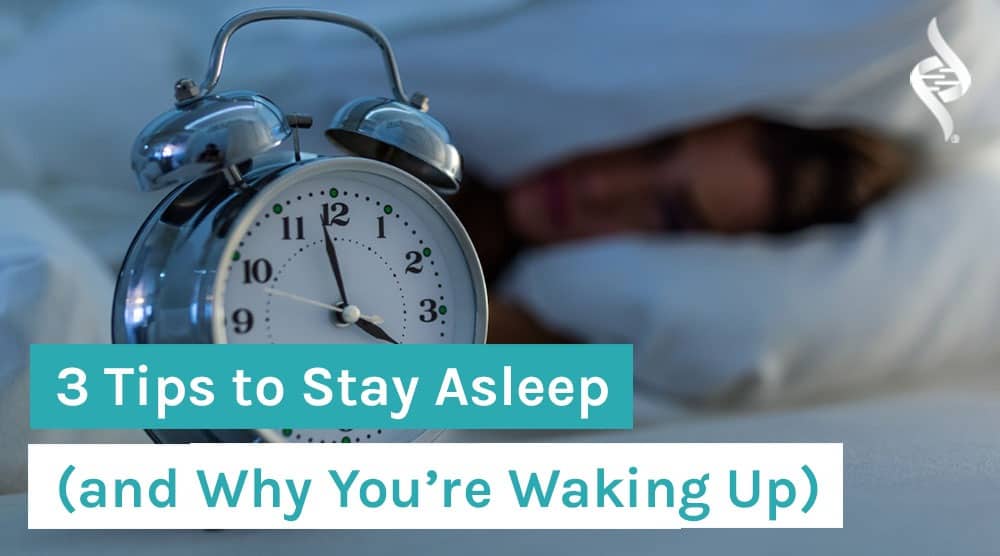3 Tips to Stay Asleep (and Why You’re Waking Up)
Video Transcript:
Today, I’m going to share with you three tips for staying asleep. One of the most common complaints that I get is folks finding that they’re waking up in the middle of the night. Generally, that will be between 1:00 AM and 3:00 AM. And if you are experiencing that kind of frequency in waking up and you’re noticing the same time every night you’re waking up, it’s going to tell us a little bit more about the imbalance in your circadian rhythm. That’s your body clock.
Balancing Our Circadian Rhythm
A lot of my patients have an imbalance, kind of disjointed and reverse body clock. Their circadian rhythm has them waking up or staying awake at night, versus being awake during the day. And I want to share with you there are really three kinds of key tips for balancing this. But there’s really also three core reasons why you’re waking up or having an imbalance in your sleep at night.
So, the three tips are going to address the three different root causes, so I want to share with you the reason why you might have a hard time staying asleep, and then I’m going to share with you the three solutions to address those root causes.
#1. Addressing Hormonal Imbalances
So, number one, all three of these are going to be involving some sort of degree of hormonal imbalance. The most imbalanced organ that we find that will keep you waking up at night is going to be your liver. So your liver is going to either be awake or not hibernating at night, meaning our liver has to rejuvenate. And depending on lifestyle habits, depending on caffeine consumption or alcohol consumption, dietary consumption, or stress influences, and hormonal imbalance, then that can lead to the liver not shutting down and hitting its rejuvenation status. So generally, that 1:00 AM, 3:00 AM time, we can correlate that to being liver-focused.
Now, the other root cause is going to be neurotransmitter-related. This is neuroendocrine. This is all about your brain sending signals to assorted endocrine glands that are going to be causing you to have that imbalance. Generally, when I lab test my patients, I’ll see lower GABA neurotransmitter levels and lower melatonin levels. These also are going to be indicative of neurometabolic diseases that can skew that whole sleep cycle.
And then another core cause, which affects so many of us, is stress. Stress can directly flip-flop and change our circadian rhythm. So, addressing those three common imbalances are going to be critical for you staying asleep.
So how do we do that? Number one is to support your liver, and this is so easy. I recommend grabbing dandelion tea and drinking that two to three times a day, so a cup of dandelion tea in the morning, around lunchtime, and maybe even a few hours before bedtime will really help support your liver detoxification. It can also help support some of that hormonal imbalance. The way the liver is able to synthesize and metabolize estrogen is really critical. And it allows the detoxing of the liver during the day so that your liver can go into a restorative state and will keep you sleeping longer. I love that. It’s one of the fastest fixes for that waking up in the middle of the night.
#2. Maintaining Melatonin Levels
Number two is to address the melatonin imbalance, and this is really important because melatonin, we have a change as we age in the body’s production of melatonin. And our pineal gland is the gland that’s producing the melatonin. And as we age, we actually see a calcification of the pineal gland, so it’s very common as folks start aging, as they get into their 40s, their 50s, and 60s, we start to see the sleep imbalances change. Well, that ends up being indicative of what’s happening with the pineal gland.
When we’re looking for deeper balance of the pineal gland and the preservation of that gland, we need to support it with about 1-3 milligrams of melatonin. And the best time to take that is about an hour to two hours before you go to bed. That also helps support waking up and invigorating the pineal gland so we see less of the calcification. You’re going to see long-term benefits to your neuroendocrine health. But more importantly, you’re going to see being able to sleep longer, more fully, and ultimately, we’re slowing down your aging process.
#3. Keeping Stress Hormones In Check
Third and final way to get sleep thoroughly and having longer, better improved sleep is to address your stress hormone levels. And this is really important, exercise is one of the most clinically researched and proven ways for you to lower your stress hormones. I do recommend that you exercise at minimum four hours or more before your bedtime, so meaning try to exercise in the morning. Get some natural sunlight. Definitely exercising outside is great. Granted, in the winter months, sometimes that’s challenging, but making sure you exercise before lunchtime is a better practice to support that whole circadian rhythm.
The other thing that I recommend, that’s right here at Organixx, is going to be Magnesium 7. Magnesium is another pro-sleep supportive supplement. It actually helps to release toxins and really fluid accumulation that can often cause individuals to get up and urinate during the middle of the night. That’s a common, common complaint I hear from both men and women, where sometimes they’re dehydrated, and we need to help support that whole sleep balance by making sure magnesium is taken throughout the day.
So, if you are sleep-imbalanced, I’m recommending taking two capsules of Magnesium 7 right when you wake up, and then take another one capsule, one or two capsules right at dinner time. Allow space for the magnesium to help articulate that fluid flush, and you want to make sure that’s anywhere from two to three hours before bedtime.
And last and final, one of my favorite complexes that is very powerful at lowering your stress levels is a complex called Relora. Relora is a combination of two plant barks. It’s magnolia and philodendron. These are actually shrubs that most of us have in our backyard. And unbeknownst to us, they are very helpful in lowering the cortisol level. That’s the stress hormone that sometimes gets flip-flopped. So, adding Relora in the evening time, maybe one or two hours before your desired bedtime, will help your stress level decrease and start to change the flip-flop of your circadian rhythm.
So, these are three powerful tips to help you stay asleep better and longer, and will help support more rest-filled sleep. Let us know how these tips help you get more restful sleep.
Magnesium deficiency is linked to stress, diabetes, heart disease, osteoporosis, chronic fatigue syndrome, depression, anxiety, trouble sleeping, sore muscles, migraines, and many more debilitating health conditions.
If your body needs magnesium, you want the most beneficial kind your body can actually absorb. Organixx Magnesium 7 gives you seven (7) of the very best, most bioavailable types of elemental magnesium available.






I read somewhere that magnesium gets flushed from the body very rapidly and the best way to dose is slowly over a 17min period.
I have chronic insomnia. Sleep maintenance insomnia for the past four years. Do you see Patience remotely? I live in Tennessee.
Hi Mary Ann,
We're sorry to hear about the health challenges you are currently facing.
If you’d like to get Dr. Melissa’s expert advice on a personal health situation, she does offer the Organixx community a discount for booking a virtual session with her.
To get 10% off a 30 or 60-minute session with Dr. Melissa, please use the following link: https://organixx.com/dr-m-bio/
We hope this helps and wish you all the best on your continued health journey.
Does Dr Gallagher see Patients remotely?
My husband has "restless body syndrome which doesn't allow him to get more than a few hours of sleep. He takes magnesium spaced throughout the day, along with many supplements. Is there anything you have heard of that can stop these nerves from firing during the night so he can sleep?
Dr. Melissa Gallagher, Naturopathic Physician. My husband has Type 2 Diabetes, Sleep Apnea, High Blood, insomnia, overweight. It does not make a difference if eats or what he eats, the blood sugar is 250 - 380. The two kinds of insulin he takes do not bring down either. He just feels bad all the time. He will be 68 on Nov. 20. He desperately needs help.